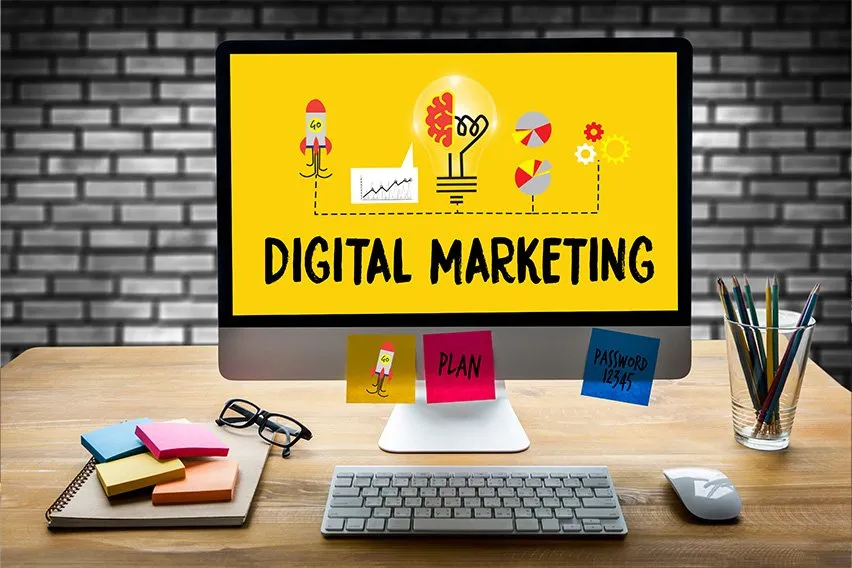How to Start a Digital Marketing Agency in 5 Steps

WordStream’s 2020 State of the Agency report revealed some surprising statistics regarding the expansion of digital marketing agencies across the globe. The key takeaway? That it’s an essential, ever-expanding service for businesses looking to grow.
Inspired by the opportunities, many people have become digital marketing agents or want to build their own digital agency. From independent contractors to full-on agencies, numbers indicate that there’s much money to be made in the online marketing space.
Want to experience this success for yourself? Here are our tips for starting a digital agency of your own in 2020.
How Do I Start a Digital Marketing Agency with No Experience?
One of the most common questions aspiring marketers ask is how to launch a digital agency when you have little to no experience to draw on. While skills can certainly be learned and fine-tuned over time, you will need some know-how in order to start selling services to clients at a digital agency.
The marketing industry has earned a reputation of housing many “snake oil” marketers who overpromise on their services but underdeliver when it comes to results. To truly succeed in this space, you’ll need to be able to help your clients earn a tangible return on their investment.
The key to starting a digital agency with no experience is to gain experience. There are few ways to do this:
- Start your own website and successfully grow your traffic and social media following
- Offer free work to businesses, deliver amazing results and start building up testimonials
- Land a job at an existing business to gain experience
- Land an in-house gig doing marketing for a business
- Hire a coach, consultant or mentor to help you learn strategies
- Take a course to learn the basics and more advanced strategies
The bottom line: You’ll need to make sure you learn how to do the job before you can start selling your services. The good news is you can acquire these skills rather quickly and then start pursuing prospective customers.

What Is a Digital Marketing Agency, Really?
This type of company helps other businesses and organizations get their products and services in front of potential customers. Digital agencies may offer a wide range of services with the goal of helping their accounts generate more revenue online.
How agencies differ from independent marketers is in the fact that agencies typically employ two or more team members. Agencies can range in size from two marketers to hundreds of experts, content marketing professionals, sales reps, writers and more.
Many people decide to start a full-on agency so they have more resources and people available to provide the best services possible to their clients. This can be a lucrative model compared to being a one-person show.
How Profitable Is Digital Marketing?
According to ZipRecruiter, the average annual pay for a freelance/independent digital marketing manager in 2020 in the U.S. is $68,970 per year. The majority of salaries range from $47,000 to $84,000 per year, but may go as high as $127,000 per year.
Profitability as an agency varies widely depending on the services offered, the industries serviced and the marketing team’s experience level. New marketers should expect to be at the lower end of the spectrum while more established, highly-skilled marketers can expect to bring in the big bucks.
Types of Services Offered by Digital Agencies
While many digital agencies are generalists in that they offer a wide range of services, others many choose to specialize in a particular type of service. With this in mind, you need to decide which services you’d like to offer and then take the time to master these skills in order to grow a successful agency.
Here are just a few of the many services an agency may choose to offer:
- Social media marketing: Using social media platforms like Facebook, Instagram, Twitter and others to increase follower engagement, drive website traffic and generate leads for businesses
- Content marketing: The creation and marketing of content like eBooks, blog posts and downloadables to grow a business’s email list, attract backlinks, generate leads and more
- Email marketing: Growing a brand’s email list, sending targeted email campaigns, and generating leads or sales from the brand’s subscriber list
- Website design and development: Designing, optimizing and managing a business’ website to make a positive first impression, drive traffic and generate leads
- Copywriting: Writing targeted ad, email or website copy to turn traffic into paying customers
- Content writing: Writing engaging content for social media, blogs and guest posts to drive traffic and convert readers into customers
- Search engine optimization (SEO): Optimizing a business’ website to rank for specific keywords users are searching for in Google to drive organic traffic
- Search engine marketing (SEM): Optimizing a business’s online presence to rank higher in the organic or paid search engine results pages to generate organic traffic
- Pay per click (PPC) advertising: Launching and optimizing paid ads to drive traffic to a business’s website or landing pages
- Facebook advertising. Creation of Facebook Ads to drive clicks and attract customers
- Display advertising: Management of a brand’s display ads across platforms to drive clicks and sales
- Coaching or consulting: Offering advice to brands on how to improve their online presence, run their business more smoothly, hire the right team, etc.
- Lead generation: Implementation of a variety of strategies to generate high-quality leads for businesses
- LinkedIn marketing: Use of LinkedIn to build connections, boost engagement and generate leads for brands
- Inbound marketing: Employing a variety of non-invasive marketing strategies to attract potential customers who are already searching for specific services, brands or products
- Review generation: Generating positive reviews to help businesses improve their online reputation
- Public relations and reputation management: Landing features or interviews in industry publications to boost a brand’s online authority and generate referral traffic
7 Skills to Become a Successful Digital Marketer
Beyond having at least a general understanding of the types of services you aim to offer, there are some practical and interpersonal skills you might want to have to assist you on your journey. None of these are required, but they will certainly make running a successful agency much easier.
Here are seven skills you need to know to become a great digital marketer:
- Data analysis: This involves the ability to understand, analyze and organize data in order to make informed decisions regarding strategy. You should also be able to use common analytic tools—like Google Analytics—to generate reports for your accounts.
- Creative problem solving: Digital marketing isn’t always straightforward. Having creative problem solving skills will help you think of innovative solutions to help your customers get the best results from their marketing campaigns.
- Communication skills: Marketers should be able to effectively communicate with their clients and even their prospective customers. This often includes written and verbal communication skills.
- Organizational skills: Once you begin managing several projects, you’ll need to keep the details and documents in order. Organizational skills will come in handy when it comes to staying on-task and delivering high-quality work.
- Time management: Like organizational skills, you’ll want good time management skills to stay on deadline and deliver your projects in a timely manner. This will prevent bad reviews and unhappy customers.
- Customer service: It’s likely that you will experience some issues and possible conflicts with your customers that need to be addressed. Practice patience in answering questions, offering feedback and resolving problems.
- Sales: As a marketer, you will need to be able to sell yourself (or hire someone to sell your services for you). Sales skills will help you communicate your value and close deals.
Essential Steps to Starting a Digital Marketing Agency
Do you have what it takes to succeed at starting a digital marketing business? We think so! To help you out, we’ve broken down the five essential steps to starting your own agency from scratch.
1. Define Your Target Audience and Offer
There are many different types of digital marketing agencies and there are many different ways to set up a digital marketing agency. What sets one agency apart from another is how well they are able to get laser-focused on who their target audience is and take the time to come up with the right offer for that one audience.
In a sea of generalist agencies, you want yours to be one of the few to stand out. In order to do that, you’ll need to make sure to identify the specific type of business you want to serve and which services will provide the most benefit to that business.
Defining Your Target Audience
To define your target audience—or what many call your “ideal client”—you’ll need to make sure to ask yourself a few questions regarding who you want to work with. Saying you want to work with small businesses, entrepreneurs or coaches is far too broad, and will leave you drowning in a sea of competition in no time.
To get more specific about who your ideal client is, ask yourself these questions:
- What types of people do I like working with the most?
- What types of businesses could I help the most?
- Do I have experience working with these types of businesses?
- If not, is it practical for me to take the time to gain experience working with these types of businesses?
- Do I want to serve a specific geographical area?
- Does my preferred audience have the budget required to pay what I want to charge for my services?
- Is this niche saturated with competition or will I be able to stand out from the crowd?
There are many more questions you can ask yourself in regards to who you want to work with. Most importantly, you should work with people you enjoy working with and who have the budget to pay you what you’re worth. Then, it’s just a matter of taking the time to define your offer.
Solidifying Your Offer
Your “offer” doesn’t have to be a singular offer; it’s just a word for what’s going to be your unique selling proposition (USP). Your USP is the one main thing your business brings to the table that makes you stand out from other agencies.
For example, if you know you want to work with local fashion retailers in Seattle, your USP may be that you “help Seattle-based fashion retailers increase foot traffic with local SEO.” In this statement, you define who you serve, what you do and how you do it.
Your offer should be something your potential customers both need and want. So if you are working with law firms, the best offer may not be Instagram marketing, since their clientele isn’t searching for law firms on Instagram. Instead, your offer may be SEO to drive traffic and generate client leads.
A simple USP statement is essentially: “I help [type of businesses] accomplish [goal] by [method .”
Here are some examples:
- “X Agency helps Columbus wedding photographers land more customers with Facebook Ads”
- “I help relationships coaches get more course signups with effective copywriting and sales funnels”
- “We use data-driven LinkedIn marketing strategies to help recruiters land more corporate clients”
Once you’ve taken the time to identify your target audience and have defined your offer, you’ll have a better idea of where to set your sites when it comes to generating leads for your agency.
2. Establish a Lead Generation Strategy
The success of your digital agency depends on you having a consistent stream of new client leads so you always have revenue coming in. Without a lead generation strategy, you risk clients dropping off without you having a way to make up for that loss in revenue in ample time.
Now, who your target audience is will play a major role in what methods you use to generate leads. Different audiences use different types of platforms to find agencies to work with. They might use Google, search on Facebook, browse LinkedIn or use a variety of other methods.
Below are some of the top lead generation strategies agencies use to find clients.
SEO
Many business owners head to Google to find reliable agencies. They might search for “best digital marketing agencies in Seattle” or for retailers, or similar—these are essentially the terms you can try to get your agency to rank for through SEO.
On your website, you can target the key terms your audience is using to find agencies like yours. Use common keyword research tools like Keywords Everywhere or SEMrush to find the perfect keywords, compare competition level and confirm they are the right fit for your site.
Then, you can attract new clients to your agency, organically, over time.
You can post engaging, informative content on Facebook to increase brand awareness, interact with your followers and generate new leads for your business. While organic reach on Facebook isn’t what it used to be, it’s still one of the most powerful tools for agencies.
Beyond your business Facebook page, you can join niche Facebook groups and build connections there. Without pitching your services, form relationships with other people in the group in hopes of attracting or at least growing your referral network.
Instagram is one of the best lead generation platforms for visual design agencies, like graphic designers or website designers. Here, you can post eye-catching graphics that showcase your work and draw in potential clients.
Instagram has its own unique algorithm that relies on hashtags and engagement metrics to determine what content will get shown to users. If you want to master Instagram as a lead generation channel, you best brush up on Instagram best practices to learn what content is likely to get your business noticed by potential clients.
Paid Ads
Agencies also run paid ads on Google, Facebook, Instagram and other PPC platforms. This can be one of the best ways to hone in on your target audience and generate leads quickly. While less time-consuming, this tends to be the more expensive lead generation option.

3. Land Your First Paying Clients
Once you have a lead generation strategy in place, it’s time to land your first paid clients. Most agencies choose to get leads on a free discovery call to chat with the prospective client about what they are looking for, pricing and next steps.
This is where your sales skills come into play. If you are new to sales, don’t worry—it takes practice! Just do your best to listen to your prospective client’s needs and then present them with a solution (i.e., your offer) that will help them achieve what they are looking for.
Once you’re ready to start billing your clients, you can use automated accounting software to send invoices online, take credit card payments and manage your business finances. Having this software at your fingertips will help you stay organized and make informed financial decisions in your business.
4. Deliver Great Work and Amazing Results
“Acquiring a new customer can cost five times more than retaining an existing customer.”—OutBoundEngine
With this in mind, client retention should be high priority. To keep clients coming back for more, you’ll need to deliver great work and amazing results.
Your clients are investing money with you with the expectation of increasing their own business revenue. The greater return on investment (ROI) you are able to generate with your marketing services, the more likely they are to stick around and send new business your way.
As you grow, prioritize asking clients for positive reviews and building case studies. This is one of the best ways to stand out from your less-accomplished competitors and justify charging higher rates.
5. Stand out from Your Competitors
As an agency owner, you should constantly be looking for new ways to stand out from your competitors. This could mean having the most positive reviews, the best results, the most attractive branding, or all of the above.
You want your agency to be the obvious choice to your potential clients. Focus on delivering amazing work and real, revenue-generating results and you’ll be sure to stand out from the crowd.
Launch Your Successful Agency Today
There is no single path to agency success, but now you have many of the tools you need to get started in the right direction. At their core, every agency has the same purpose: to help their clients thrive.
Start with defining your target audience and your primary offer, then establish your own winning lead generation strategy. Then, close your first playing clients, deliver results they love and scale your business to new heights.
RELATED ARTICLES

 How to Start a Catering Business
How to Start a Catering Business How to Start a Courier Business
How to Start a Courier Business 8 Steps to Starting a Successful Transport Business
8 Steps to Starting a Successful Transport Business How to Start a Successful Trucking Company
How to Start a Successful Trucking Company How to Start a Consulting Business
How to Start a Consulting Business How to Start a Farm: Grow Your Farming Business from the Ground Up
How to Start a Farm: Grow Your Farming Business from the Ground Up